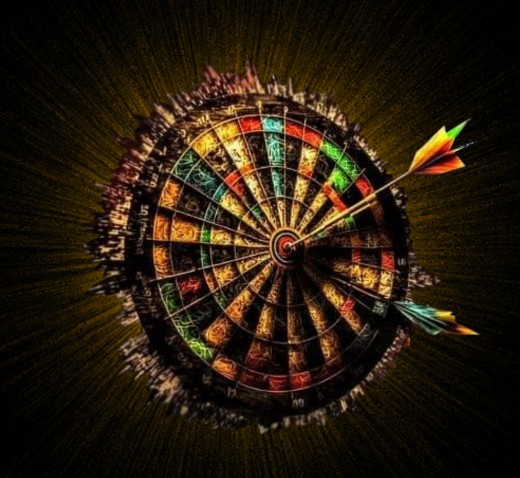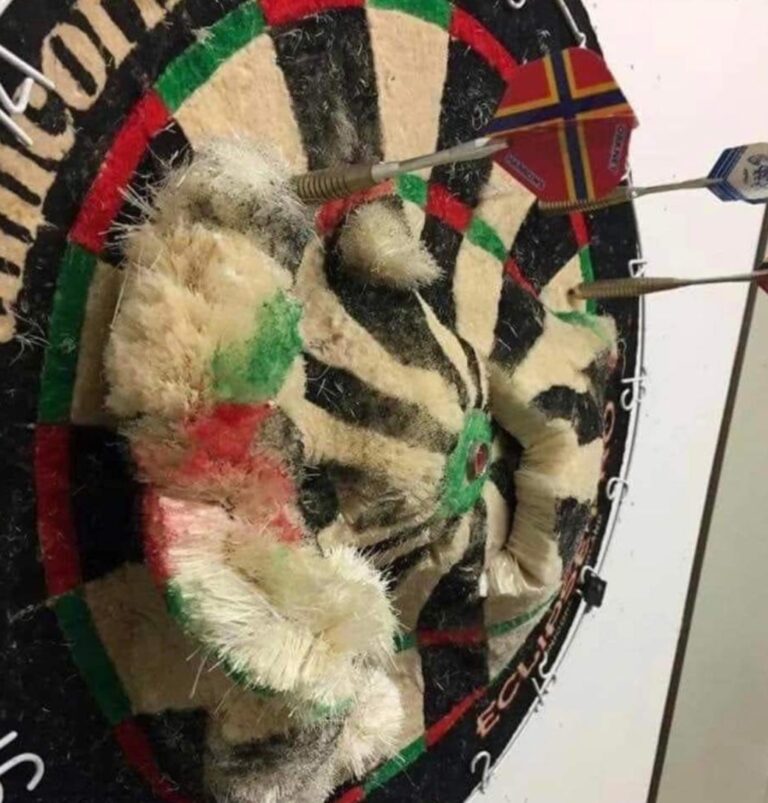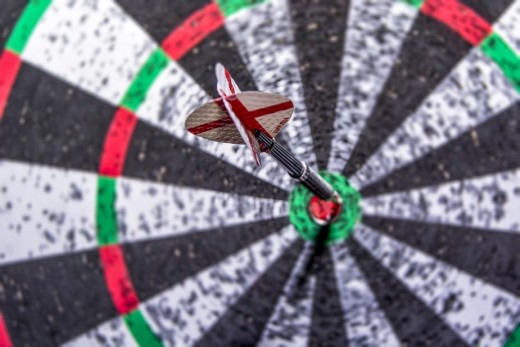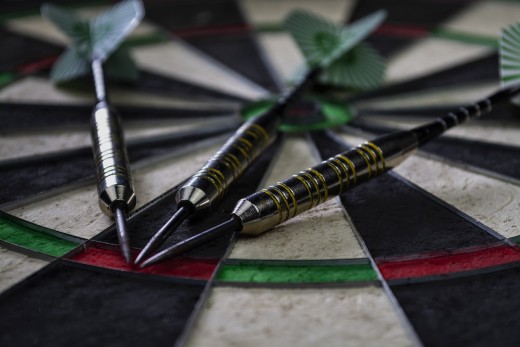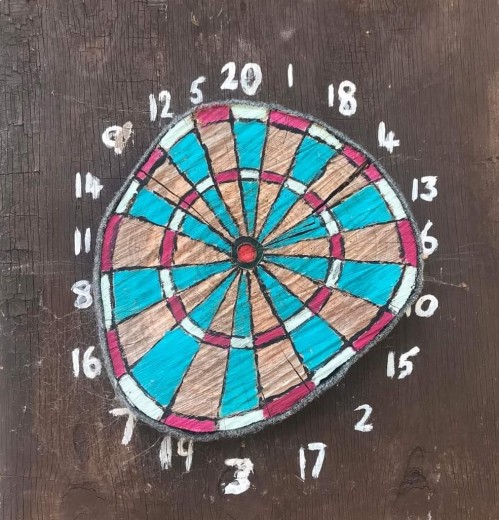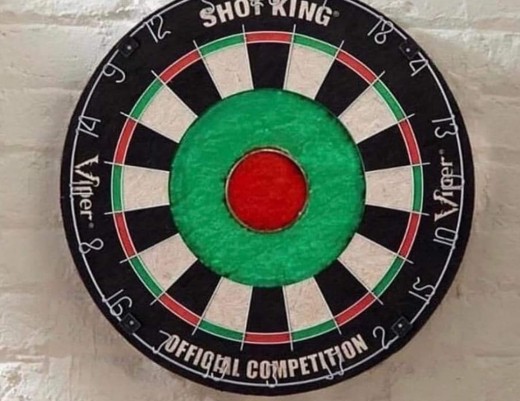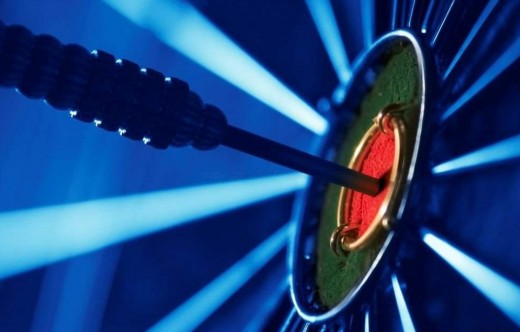Thursday, December 12, 2019
Column 583
Baggish, Campbell, Young – can they do it?
As the holiday season begins and the 2020 PDC world championship moves into full swing – with £2.5 million on offer (an amazing £500,00 to the winner) – talk within the North America darts community naturally keeps coming back to an evaluation of our player’s chances.
Of course, Danny Baggish, Matt Campbell and Darin Young have the talent and, with Young in particular, the experience. But with 38 qualifiers from the UK and 11 from the Netherlands – literally 50 percent of the entire 96-player field – the odds are heavily stacked, unfairly say I, against the North Americans – and anyone from anywhere else on the planet.
Can one of the North Americans pull off the series of upsets needed to advance into serious money rounds?
Can one of them win?
Reflect for a moment on what many maintain was the greatest world championship final ever…
In 1999, I sat down in a bar outside of Toronto to interview John Part. He’d won the Embassy in 1994, was ranked 6th by the World Darts Federation and was holding down the number one spot in Canada.
We’d met a few years before at a tournament and become friends. When business had me headed to Toronto I’d call ahead and we’d arrange to meet. We’d have a few beers and throw a few games. I remember him stepping up once and throwing in a 180. I followed it with a two. I had him just where I wanted him!
I didn’t learn much that night we sat down to talk. That’s because John Part isn’t cut from the same stereotypical mold as most darters. He wasn’t much interested in talking about gambling, women or his favorite beer. Okay, that’s a lie.
But one thing he said made a lasting impression.
It wasn’t long before Part was quoting Ernest Hemingway and only a little longer before he tried to turn the interview around on me. “Santiago had a goal,” he challenged. “He hung in there for days, baking in the sun and nearly dying, to land his dream, eh? You gotta have goals, eh?”
Realizing I had none, at least none which any Playboy centerfold would agree to, I popped the question right back at him. Trying to find common ground, I even spoke in his native tongue. “Hey, I’m doing the interviewing here, eh? What are your goals, eh?”
“My goal,” he replied, “is to be the dominant player in the world.” Yep, I’ve always remembered that. Apparently so did Part.
I thought about this conversation when Part was pummeled 7-0 by Phil Taylor at the 2001 world championships (earning £18,000 for second place – this year the runner up will pocket £200,000). I thought about it again in 2002 when he was defeated by Taylor two more times, at the Stan James World Matchplay and the Paddy Power World Grand Prix.
So, I dug out and re-read my dog-eared copy of Hemingway’s The Old Man and the Sea. “Fish, I love you and respect you very much,” remarked the compassionate Santiago at one point in his epic battle with the marlin. “But I will kill you dead before this day ends.”
Santiago remains one of literature’s finest examples of a character exhibiting what Hemingway called “grace under pressure.” Even though only his marlin’s carcass is left by the end of the story, Santiago was a winner because he never quit, valiantly fighting off the sharks until there was nothing left to fight for.
John Part reminded me of Santiago.
I wasn’t present at the 2003 world championship at Circus Tavern in Purfleet when Part in the final against Taylor “snatched the first leg with a 121 checkout and roared into a 3-0 set lead.” At the time, Taylor was the ten-times world champion and the 7-1 odds favorite to make it eleven in a row.
I can only imagine the excitement, the thickness of the drama, as Taylor, the marlin – who hadn’t dropped a single set in a world final in three years – fought back. He evened the match at 4 and then, checked-out a spectacular 167 to take the lead 5-4. The Brits must have been swinging from the rafters. And like Santiago, Part must have been roasting under the lights of the stage.
If it had been me, I’d have peed my frickin’ pants right then and there.
There’s a memorable scene in Maya Angelou’s autobiography, I Know Why the Caged Bird Sings. Uncle Willie’s store, the black community’s gathering place in the small Arkansas town where Angelou grew up, is crammed. Their hero, Joe Lewis, is defending his heavyweight championship against the white contender, Primo Carnera. The mood is electric.
It had to be just like this at Purfleet. Darth Maple versus The Power. The Canadian contender versus the British Champion of the World.
I could hear The Power’s fans…
“I ain’t worried ’bout this fight. Joe’s gonna whip that cracker like it’s open season,” boasted one patron at Uncle Willie’s. “He gonna whip him ’till that white boy call him Momma,” said another.
I’m just sure that’s what they all thought, the Brits. But then the first dart was thrown…
The bell rings. The announcer begins to call the action. “A quick jab to the head. A left to the head and a right and another left.” They’re in a clinch. Lewis is trying to fight his way out.”
“Carnera’s got Lewis against the ropes. It’s a left to the body and a right to the ribs. Another right to the body; it looks like it was low. Yes, ladies and gentlemen, the referee is signaling but the contender keeps raining blows on Lewis. It’s another to the body, and it looks like Lewis is going down.”
Part had Taylor on the ropes from the opening dart. The Power was going down.
But then, Lewis bounces off the ropes. The announcer continues. “And now it looks like Joe is mad. He’s caught Carnera with a left hook to the head and a right to the head. It’s a jab to the body and another left to the head. There’s a left cross and a right to the head. The contender’s right eye is bleeding, and he can’t seem to keep his block up. Louis is penetrating every block. The referee is moving in, but Lewis sends a left to the body and it’s an uppercut to the chin and the contender is dropping. He’s on the canvas, ladies and gentlemen.”
Suddenly, just like a snake strikes, Taylor moved into his stride. They didn’t call him The Power – he wasn’t then ten-times Champion of the World – for nuthin’. Down 3-0 and then 4-1, Taylor went on a tear. He ripped off eleven straight legs at one point, including a 12-darter, in a display which had for years brought down lesser men. Darth Maple’s commanding 3-0 lead was whipped out in a flash. It was now Santiago who was on the ropes.
The men in Uncle Willie’s store lean closer to the radio…
“Here’s the referee. He’s counting. One, two, three, four, five, six, seven. Is the contender trying to get up again?”
The men at Uncle Willie’s jump up and shout, NO!”
“…eight, nine, ten. The fight is over, ladies and gentlemen. Let’s get the microphone over to the referee. Here he is. He’s got the Brown Bomber’s hand. He’s holding it up. Here he is.”
And then, to the world, the familiar voice of the referee proclaimed, “The winnah, and still heavyweight Champeen of da World, Joe Lewis.”
But that’s not quite the way it went down at Purfleet…
Santiago fought back. He evened the score at 5 and then recaptured the lead. At 6-5 Part was just a set away from his dream.
But the great fish was still strong. He jumped to a quick 2-0 lead in the 12th set and, although Santiago notched up the 3rd leg, Taylor tied the match at 6-0, forcing a deciding 13th set.
And that’s what it all came down to.
One set for the Championship of the World…
John Part versus the great Phil Taylor.
Darth Maple versus The Power.
The Canadian versus the Brit.
Primo Carnera versus the Brown Bomber.
Hemingway’s Santiago against the marlin he loved and respected.
In the first leg of the deciding set Part broke Taylor’s throw straight away. Two legs to victory…
Part then took the second leg. One leg to go…
But Taylor struck back! He closed 98 to push the set to the fourth leg…
And then, John Part shocked the darting world.
“…77 remaining…”
“Set. Stroke. Release. 19.”
“Set. Stroke. Release. 18.”
“Set. Stroke. Release. TOPS!”
“Leg. Set. MATCH! The match is over, ladies and gentlemen. Let’s get the microphone over to the referee. Here he is. He’s got the Canadian’s hand. He’s holding it up. Here he is.”
“The winnah, and NEW Champeen of da World, John Part.”
A lot’s been written since John Part did what no one else could do.
The match was described as a “breathtaking contest.” An “epic.” The “greatest final of all time.” A momentum-shifting roller-coaster of a ride that ended in the passing of the torch and a big, fat (at the time!) $50,000 deposit into John Part’s bank account.
“I was almost in tears on the stage at the end,” Part was quoted. “I really had to fight it.”
“January the 5th, 2003,” wrote the legendary John Lowe, “will go down in the darting world as the end of the reign of King Phil Taylor and the beginning of the reign of King John Part. Just like at Buckingham Palace, the guard has changed.”
Well, not exactly…
As the inimitable boxing commentator Larry Merchant once put it in 1990 after Buster Douglas knocked out the 42-1 favorite Mike Tyson in Tokyo, “The Japanese came to see Godzilla, but the wrong person turned out to be Godzilla.”
Perhaps this was just more of the same?
I pondered at the time… “Can Part now wrestle away Taylor’s number one ranking? Can he defend his World Championship in 2004?”
“Has the torch really been passed? Has the guard really changed?”
Of course, it had not. Taylor went on to win six more world championships before retiring in 2018.
The point is that it can be done. John Part was a fighter. He drew strength from his defeats. On January 5, 2003, he exhibited the sort of grace under pressure that, at least for a while, had him perched atop the darting world.
Danny Baggish, Matt Campbell and Darin Young are capable of the same.
From the Field,
Dartoid

